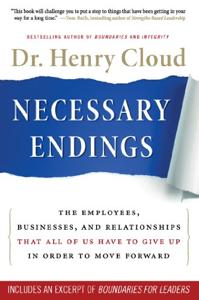
Want to learn the ideas in Necessary Endings better than ever? Read the world’s #1 book summary of Necessary Endings by Henry Cloud here.
Read a brief 1-Page Summary or watch video summaries curated by our expert team. Note: this book guide is not affiliated with or endorsed by the publisher or author, and we always encourage you to purchase and read the full book.
Video Summaries of Necessary Endings
We’ve scoured the Internet for the very best videos on Necessary Endings, from high-quality videos summaries to interviews or commentary by Henry Cloud.
1-Page Summary of Necessary Endings
Introduction
Have you ever been to a rose garden? If so, you probably noticed that some bushes had more flowers than others. The ones with the most flowers must have been fed and nurtured by their caretakers. However, not all buds can be nourished at once because resources are limited. Therefore, those who take care of the roses will regularly remove dead branches or sickly buds because they aren’t going anywhere anyway. By doing this, they free up resources for healthy buds to grow into mature plants.
Your life is like a rose bush. You have limited time and energy, so you need to regularly evaluate the people in your life as well as the groups or endeavors that are taking up too much of your resources. It’s difficult to let go of these things, but it will make room for more fulfilling relationships and projects in your life.
In this book, Henry Cloud helps people come to terms with the necessity of ending certain relationships and gives them tips on how to do so. He says that endings are important in life because they help us move forward without being stuck. He also explains how we can end things tactfully and still maintain our dignity while doing so.
Why Endings Are Necessary
Blaire is a friend of Henry Cloud’s who had his own business. He noticed that sales were starting to decline, so he did some research and found out that the process he was selling would soon become obsolete due to technological advancement. Blaire didn’t want to lose all the money he’d invested in his company, as well as having other reasons for sticking it out with this endeavor for just a little longer. On the other hand, Blaire felt like it was time for him to make a change before anything bad happened and decided that selling his company was best at this point in time. It turned out OK because today, Blaire is one of America’s top bond professionals.
Blaire told Cloud that although he was tempted to turn the chemical business around, he realized that it would be a waste of time. He’d already tried his best and there was nothing more he could do to improve the situation. If you want to be happy or fulfilled, you’ll need to make similar decisions over and over again. In fact, making endings a normal occurrence is essential for reaching your full potential. Everything has a life cycle: studies, work projects and relationships all have their beginnings and ends. You plant seeds for success; water them; watch them grow; harvest what’s ready; then move on to something else when it’s time for something new—or better suited—to take root in its place.”
Some people are so used to tolerating pain that they don’t notice when a job, relationship, or situation is no longer working for them. Other people have trouble ending things because they’re too caring and want to help the other person improve. Finally, some people believe that quitting means failure and would rather stick it out than admit defeat.
Because of that, people miss out on great career transitions and opportunities to leave abusive relationships. They also stay in a job longer than they should. Leaders also drive their companies down the wrong path if they don’t end something when it’s necessary. Even though avoiding endings doesn’t result in terrible things, you’ll be missing out on lots of good stuff by not pruning your life properly
How to Know Whether to Fix Things or Move On
Whether you end a project or stay with it, you will experience some form of pain. However, the difference between pain that has a purpose and pain without one is significant. Pain with a purpose is like the pain that comes from getting your tooth pulled: It hurts for a while but ultimately frees up resources to do other things in life. On the other hand, pointless pain keeps people from growing and achieving their goals in life. For example, imagine telling your dentist that you don’t want to have your tooth pulled and instead dealing with terrible gum problems for months before finally deciding to get it done. That type of unnecessary suffering takes away energy and prevents growth in life experiences as well as dental ones.






